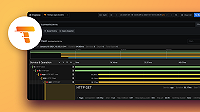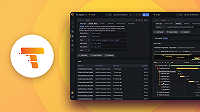Important: This documentation is about an older version. It's relevant only to the release noted, many of the features and functions have been updated or replaced. Please view the current version.
Tempo’s API
Tempo exposes an API for pushing and querying traces, and operating the cluster itself.
For the sake of clarity, in this document we have grouped API endpoints by service, but keep in mind that they’re exposed both when running Tempo in microservices and monolithic mode:
- microservices: each service exposes its own endpoints
- monolithic: the Tempo process exposes all API endpoints for the services running internally
Endpoints
(*) This endpoint is not always available, check the specific section for more details.
Readiness probe
GET /readyReturns status code 200 when Tempo is ready to serve traffic.
Metrics
GET /metricsReturns the metrics for the running Tempo service in the Prometheus exposition format.
Pprof
GET /debug/pprof/heap
GET /debug/pprof/block
GET /debug/pprof/profile
GET /debug/pprof/trace
GET /debug/pprof/goroutine
GET /debug/pprof/mutexReturns the runtime profiling data in the format expected by the pprof visualization tool. There are many things which can be profiled using this including heap, trace, goroutine, etc.
For more information, please check out the official documentation of pprof.
Ingest
Tempo distributor uses the OpenTelemetry Receivers as a shim to ingest trace data. Note that these APIs are meant to be consumed by the corresponding client SDK or a pipeline service like Grafana Agent / OpenTelemetry Collector / Jaeger Agent.
For information on how to use the Zipkin endpoint with curl (for debugging purposes) check here.
Query
Tempo’s Query API is simple. The following request is used to retrieve a trace from the query frontend service in a microservices deployment, or the Tempo endpoint in a monolithic mode deployment.
GET /api/traces/<traceid>?start=<start>&end=<end>Parameters:
start = (unix epoch seconds)Optional. Along withenddefine a time range from which traces should be returned.end = (unix epoch seconds)Optional. Along withstartdefine a time range from which traces should be returned. Providing bothstartandendwill include traces for the specified time range only. If the parameters are not provided then Tempo will check for the trace across all blocks in backend. If the parameters are provided, it will only check in the blocks within the specified time range, this can result in trace not being found or partial results if it does not fall in the specified time range.
The following query API is also provided on the querier service for debugging purposes.
GET /querier/api/traces/<traceid>?mode=xxxx&blockStart=0000&blockEnd=FFFF&start=<start>&end=<end>Parameters:
mode = (blocks|ingesters|all)Specifies whether the querier should look for the trace in blocks, ingesters or both (all). Default =allblockStart = (GUID)Specifies the blockID start boundary. If specified, the querier will only search blocks with IDs > blockStart. Default =00000000-0000-0000-0000-000000000000Example:blockStart=12345678-0000-0000-1235-000001240000blockEnd = (GUID)Specifies the blockID finish boundary. If specified, the querier will only search blocks with IDs < blockEnd. Default =FFFFFFFF-FFFF-FFFF-FFFF-FFFFFFFFFFFFExample:blockStart=FFFFFFFF-FFFF-FFFF-FFFF-456787652341start = (unix epoch seconds)Optional. Along withenddefine a time range from which traces should be returned.end = (unix epoch seconds)Optional. Along withstartdefine a time range from which traces should be returned. Providing bothstartandendwill include blocks for the specified time range only.
Note that this API is not meant to be used directly unless for debugging the sharding functionality of the query frontend.
Returns:
By default this endpoint returns OpenTelemetry JSON,
but if it can also send OpenTelemetry proto if Accept: application/protobuf is passed.
Search
This experimental endpoint is disabled by default and can be enabled via the search_enabled YAML config option.
Tempo’s Search API finds traces based on span and process attributes (tags and values). The API is available in the query frontend service in a microservices deployment, or the Tempo endpoint in a monolithic mode deployment. The following request is used to find traces containing spans from service “myservice” and the url contains “api/myapi”.
GET /api/search?tags=service.name%3Dmyservice%20http.url%3Dapi%2FmyapiThe URL query parameters support the following values:
tags = (logfmt): logfmt encoding of any span-level or process-level attributes to filter on. The value is matched as a case-insensitive substring. Key-value pairs are separated by spaces. If a value contains a space, it should be enclosed within double quotes.minDuration = (go duration value)Optional. Find traces with at least this duration. Duration values are of the form10sfor 10 seconds,100ms,30m, etc.maxDuration = (go duration value)Optional. Find traces with no greater than this duration. Uses the same form asminDuration.limit = (integer)Optional. Limit the number of search results. Default is 20, but this is configurable in the querier. Refer to Configuration.start = (unix epoch seconds)Optional. Along withenddefine a time range from which traces should be returned.end = (unix epoch seconds)Optional. Along withstartdefine a time range from which traces should be returned. Providing bothstartandendwill change the way that Tempo searches. If the parameters are not provided then Tempo will search the recent trace data stored in the ingesters. If the parameters are provided it will search the backend as well.
Example
Example of how to query Tempo using curl.
This query will return all traces that have a tag service.name containing cartservice and a minimum duration of 600 ms.
$ curl -G -s http://localhost:3200/api/search --data-urlencode 'tags=service.name=cartservice' --data-urlencode minDuration=600ms | jq
{
"traces": [
{
"traceID": "d6e9329d67b6146a",
"rootServiceName": "frontend",
"rootTraceName": "/cart",
"startTimeUnixNano": "1634727903545000000",
"durationMs": 611
},
{
"traceID": "1b1ba462b409200d",
"rootServiceName": "frontend",
"rootTraceName": "/cart",
"startTimeUnixNano": "1634727775935000000",
"durationMs": 611
}
],
"metrics": {
"inspectedTraces": 3100,
"inspectedBytes": "3811736",
"inspectedBlocks": 3
}
}Search Tags
This experimental endpoint is disabled by default and can be enabled via the search_enabled YAML config option.
This endpoint retrieves all discovered tag names that can be used in search. The endpoint is available in the query frontend service in a microservices deployment, or the Tempo endpoint in a monolithic mode deployment.
GET /api/search/tagsExample
Example of how to query Tempo using curl. This query will return all discovered tag names.
$ curl -G -s http://localhost:3200/api/search/tags | jq
{
"tagNames": [
"host.name",
"http.method",
"http.status_code",
"http.url",
"ip",
"load_generator.seq_num",
"name",
"opencensus.exporterversion",
"region",
"root.name",
"root.service.name",
"root_cause_error",
"sampler.param",
"sampler.type",
"service.name",
"starter",
"version"
]
}Search Tag Values
This experimental endpoint is disabled by default and can be enabled via the search_enabled YAML config option.
This endpoint retrieves all discovered values for the given tag, which can be used in search. The endpoint is available in the query frontend service in a microservices deployment, or the Tempo endpoint in a monolithic mode deployment. The following request will return all discovered service names.
GET /api/search/tag/service.name/valuesExample
Example of how to query Tempo using curl.
This query will return all discovered values for the tag service.name.
$ curl -G -s http://localhost:3200/api/search/tag/service.name/values | jq
{
"tagValues": [
"adservice",
"cartservice",
"checkoutservice",
"frontend",
"productcatalogservice",
"recommendationservice"
]
}Query Echo Endpoint
GET /api/echoReturns status code 200 and body echo when the query frontend is up and ready to receive requests.
Note: Meant to be used in a Query Visualization UI like Grafana to test that the Tempo datasource is working.
Flush
GET,POST /flushTriggers a flush of all in-memory traces to the WAL. Useful at the time of rollout restarts and unexpected crashes.
Shutdown
GET,POST /shutdownFlushes all in-memory traces and the WAL to the long term backend. Gracefully exits from the ring. Shuts down the ingester service.
Note: This is usually used at the time of scaling down a cluster.
Distributor ring status
Note: this endpoint is only available when Tempo is configured with the global override strategy.
GET /distributor/ringDisplays a web page with the distributor hash ring status, including the state, healthy and last heartbeat time of each distributor.
For more information, check the page on consistent hash ring.
Ingesters ring status
GET /ingester/ringDisplays a web page with the ingesters hash ring status, including the state, healthy and last heartbeat time of each ingester.
For more information, check the page on consistent hash ring.
Metrics-generator ring status
GET /metrics-generator/ringDisplays a web page with the metrics-generator hash ring status, including the state, health, and last heartbeat time of each metrics-generator.
This endpoint is only available when the metrics-generator is enabled. See metrics-generator.
For more information, check the page on consistent hash ring.
Compactor ring status
GET /compactor/ringDisplays a web page with the compactor hash ring status, including the state, healthy and last heartbeat time of each compactor.
For more information, check the page on consistent hash ring.
Status
GET /statusPrint all available information by default.
GET /status/versionPrint the version information.
GET /status/servicesDisplays a list of services and their status. If a service failed it will show the failure case.
GET /status/endpointsDisplays status information about the API endpoints.
GET /status/configDisplays the configuration.
Displays the configuration currently applied to Tempo (in YAML format), including default values and settings via CLI flags. Sensitive data is masked. Please be aware that the exported configuration doesn’t include the per-tenant overrides.
Optional query parameter:
mode = (diff|defaults):diffshows the difference between the default values and the current configuration.defaultsshows the default values.
GET /status/runtime_configDisplays the override configuration.
Query parameter:
mode = (diff): Show the difference between defaults and overrides.


